Applied Business Research Report on Accountants and Auditors
VerifiedAdded on 2021/06/18
|9
|2059
|25
Report
AI Summary
This research report, titled "Applied Business Research," delves into the crucial roles of accountants and auditors within Australian financial institutions, emphasizing their contributions to corporate governance. The report examines the responsibilities of accountants and auditors in maintaining accurate financial records, ensuring regulatory compliance, and promoting ethical business practices. It analyzes the interplay between accounting, auditing, and corporate governance theories, highlighting how these elements collectively contribute to transparency, accountability, and improved business outcomes. The study synthesizes insights from four key academic papers to explore themes such as the roles and responsibilities of accountants and auditors, corporate governance in financial institutions, and the impact of accountants and auditors on corporate governance. The report also discusses the data collection methods, managerial implications, limitations of the study, and suggests directions for future research. The report concludes by emphasizing the importance of financial reporting and corporate governance in fostering ethical business practices and organizational sustainability.
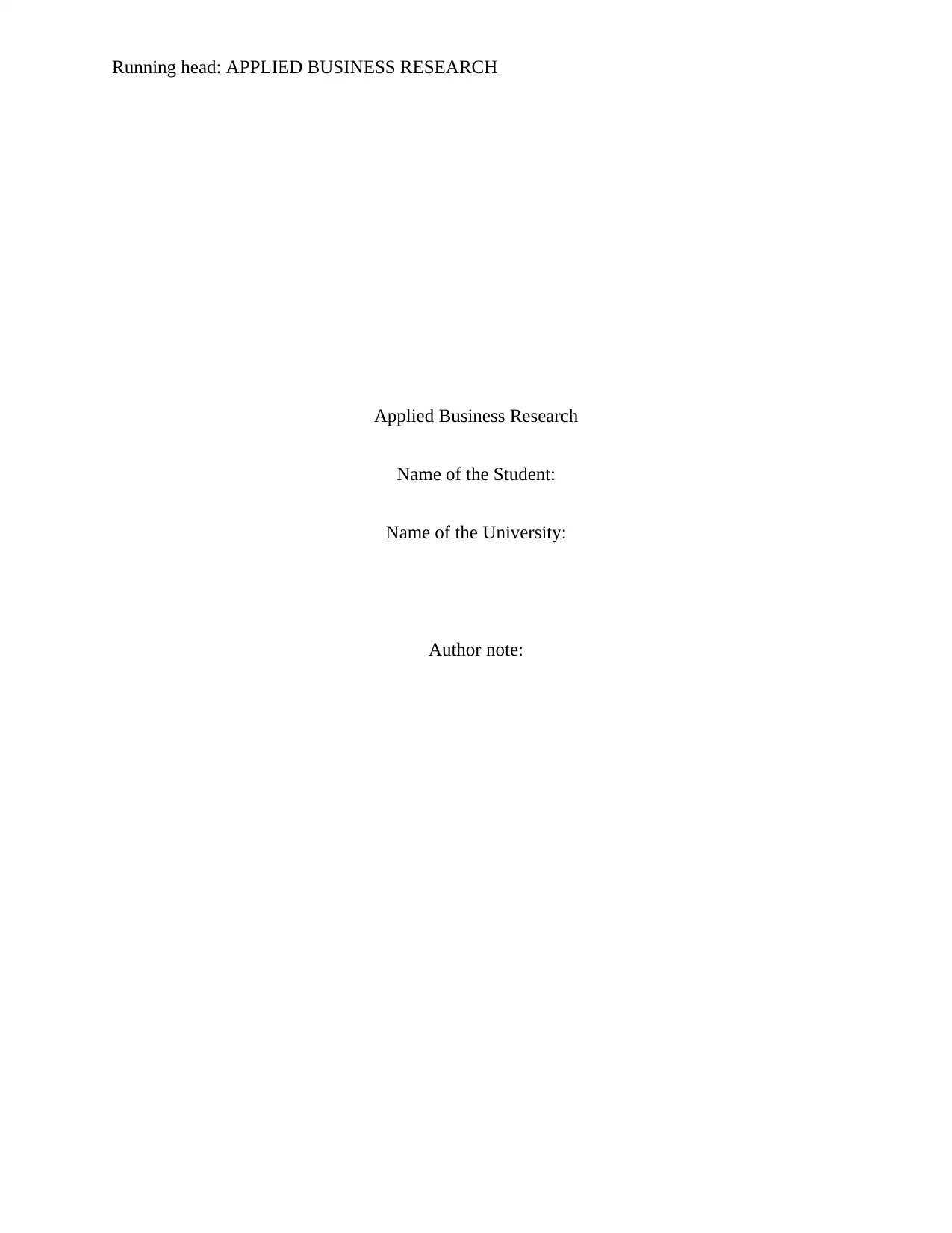
Running head: APPLIED BUSINESS RESEARCH
Applied Business Research
Name of the Student:
Name of the University:
Author note:
Applied Business Research
Name of the Student:
Name of the University:
Author note:
Paraphrase This Document
Need a fresh take? Get an instant paraphrase of this document with our AI Paraphraser
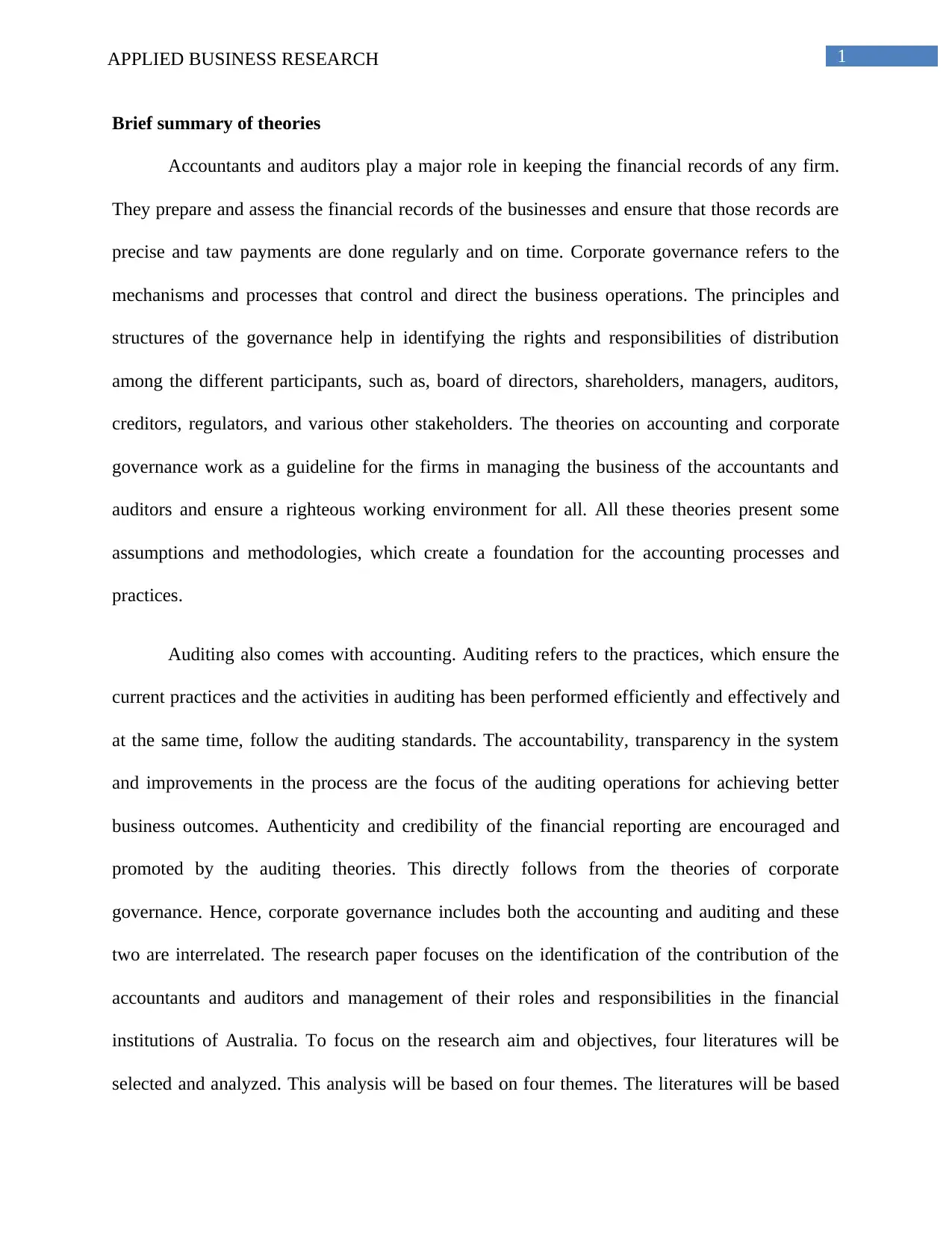
1APPLIED BUSINESS RESEARCH
Brief summary of theories
Accountants and auditors play a major role in keeping the financial records of any firm.
They prepare and assess the financial records of the businesses and ensure that those records are
precise and taw payments are done regularly and on time. Corporate governance refers to the
mechanisms and processes that control and direct the business operations. The principles and
structures of the governance help in identifying the rights and responsibilities of distribution
among the different participants, such as, board of directors, shareholders, managers, auditors,
creditors, regulators, and various other stakeholders. The theories on accounting and corporate
governance work as a guideline for the firms in managing the business of the accountants and
auditors and ensure a righteous working environment for all. All these theories present some
assumptions and methodologies, which create a foundation for the accounting processes and
practices.
Auditing also comes with accounting. Auditing refers to the practices, which ensure the
current practices and the activities in auditing has been performed efficiently and effectively and
at the same time, follow the auditing standards. The accountability, transparency in the system
and improvements in the process are the focus of the auditing operations for achieving better
business outcomes. Authenticity and credibility of the financial reporting are encouraged and
promoted by the auditing theories. This directly follows from the theories of corporate
governance. Hence, corporate governance includes both the accounting and auditing and these
two are interrelated. The research paper focuses on the identification of the contribution of the
accountants and auditors and management of their roles and responsibilities in the financial
institutions of Australia. To focus on the research aim and objectives, four literatures will be
selected and analyzed. This analysis will be based on four themes. The literatures will be based
Brief summary of theories
Accountants and auditors play a major role in keeping the financial records of any firm.
They prepare and assess the financial records of the businesses and ensure that those records are
precise and taw payments are done regularly and on time. Corporate governance refers to the
mechanisms and processes that control and direct the business operations. The principles and
structures of the governance help in identifying the rights and responsibilities of distribution
among the different participants, such as, board of directors, shareholders, managers, auditors,
creditors, regulators, and various other stakeholders. The theories on accounting and corporate
governance work as a guideline for the firms in managing the business of the accountants and
auditors and ensure a righteous working environment for all. All these theories present some
assumptions and methodologies, which create a foundation for the accounting processes and
practices.
Auditing also comes with accounting. Auditing refers to the practices, which ensure the
current practices and the activities in auditing has been performed efficiently and effectively and
at the same time, follow the auditing standards. The accountability, transparency in the system
and improvements in the process are the focus of the auditing operations for achieving better
business outcomes. Authenticity and credibility of the financial reporting are encouraged and
promoted by the auditing theories. This directly follows from the theories of corporate
governance. Hence, corporate governance includes both the accounting and auditing and these
two are interrelated. The research paper focuses on the identification of the contribution of the
accountants and auditors and management of their roles and responsibilities in the financial
institutions of Australia. To focus on the research aim and objectives, four literatures will be
selected and analyzed. This analysis will be based on four themes. The literatures will be based
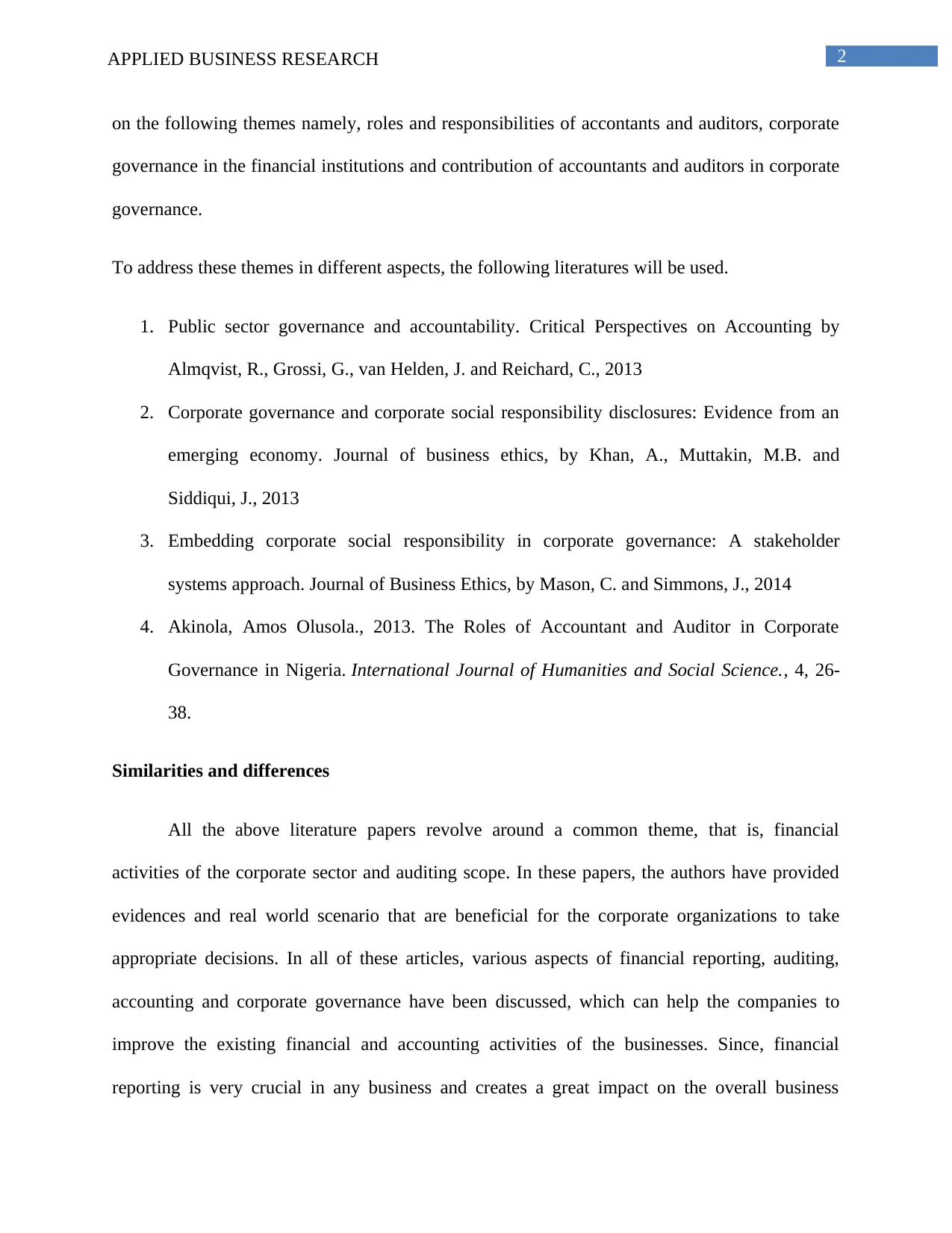
2APPLIED BUSINESS RESEARCH
on the following themes namely, roles and responsibilities of accontants and auditors, corporate
governance in the financial institutions and contribution of accountants and auditors in corporate
governance.
To address these themes in different aspects, the following literatures will be used.
1. Public sector governance and accountability. Critical Perspectives on Accounting by
Almqvist, R., Grossi, G., van Helden, J. and Reichard, C., 2013
2. Corporate governance and corporate social responsibility disclosures: Evidence from an
emerging economy. Journal of business ethics, by Khan, A., Muttakin, M.B. and
Siddiqui, J., 2013
3. Embedding corporate social responsibility in corporate governance: A stakeholder
systems approach. Journal of Business Ethics, by Mason, C. and Simmons, J., 2014
4. Akinola, Amos Olusola., 2013. The Roles of Accountant and Auditor in Corporate
Governance in Nigeria. International Journal of Humanities and Social Science., 4, 26-
38.
Similarities and differences
All the above literature papers revolve around a common theme, that is, financial
activities of the corporate sector and auditing scope. In these papers, the authors have provided
evidences and real world scenario that are beneficial for the corporate organizations to take
appropriate decisions. In all of these articles, various aspects of financial reporting, auditing,
accounting and corporate governance have been discussed, which can help the companies to
improve the existing financial and accounting activities of the businesses. Since, financial
reporting is very crucial in any business and creates a great impact on the overall business
on the following themes namely, roles and responsibilities of accontants and auditors, corporate
governance in the financial institutions and contribution of accountants and auditors in corporate
governance.
To address these themes in different aspects, the following literatures will be used.
1. Public sector governance and accountability. Critical Perspectives on Accounting by
Almqvist, R., Grossi, G., van Helden, J. and Reichard, C., 2013
2. Corporate governance and corporate social responsibility disclosures: Evidence from an
emerging economy. Journal of business ethics, by Khan, A., Muttakin, M.B. and
Siddiqui, J., 2013
3. Embedding corporate social responsibility in corporate governance: A stakeholder
systems approach. Journal of Business Ethics, by Mason, C. and Simmons, J., 2014
4. Akinola, Amos Olusola., 2013. The Roles of Accountant and Auditor in Corporate
Governance in Nigeria. International Journal of Humanities and Social Science., 4, 26-
38.
Similarities and differences
All the above literature papers revolve around a common theme, that is, financial
activities of the corporate sector and auditing scope. In these papers, the authors have provided
evidences and real world scenario that are beneficial for the corporate organizations to take
appropriate decisions. In all of these articles, various aspects of financial reporting, auditing,
accounting and corporate governance have been discussed, which can help the companies to
improve the existing financial and accounting activities of the businesses. Since, financial
reporting is very crucial in any business and creates a great impact on the overall business
⊘ This is a preview!⊘
Do you want full access?
Subscribe today to unlock all pages.

Trusted by 1+ million students worldwide
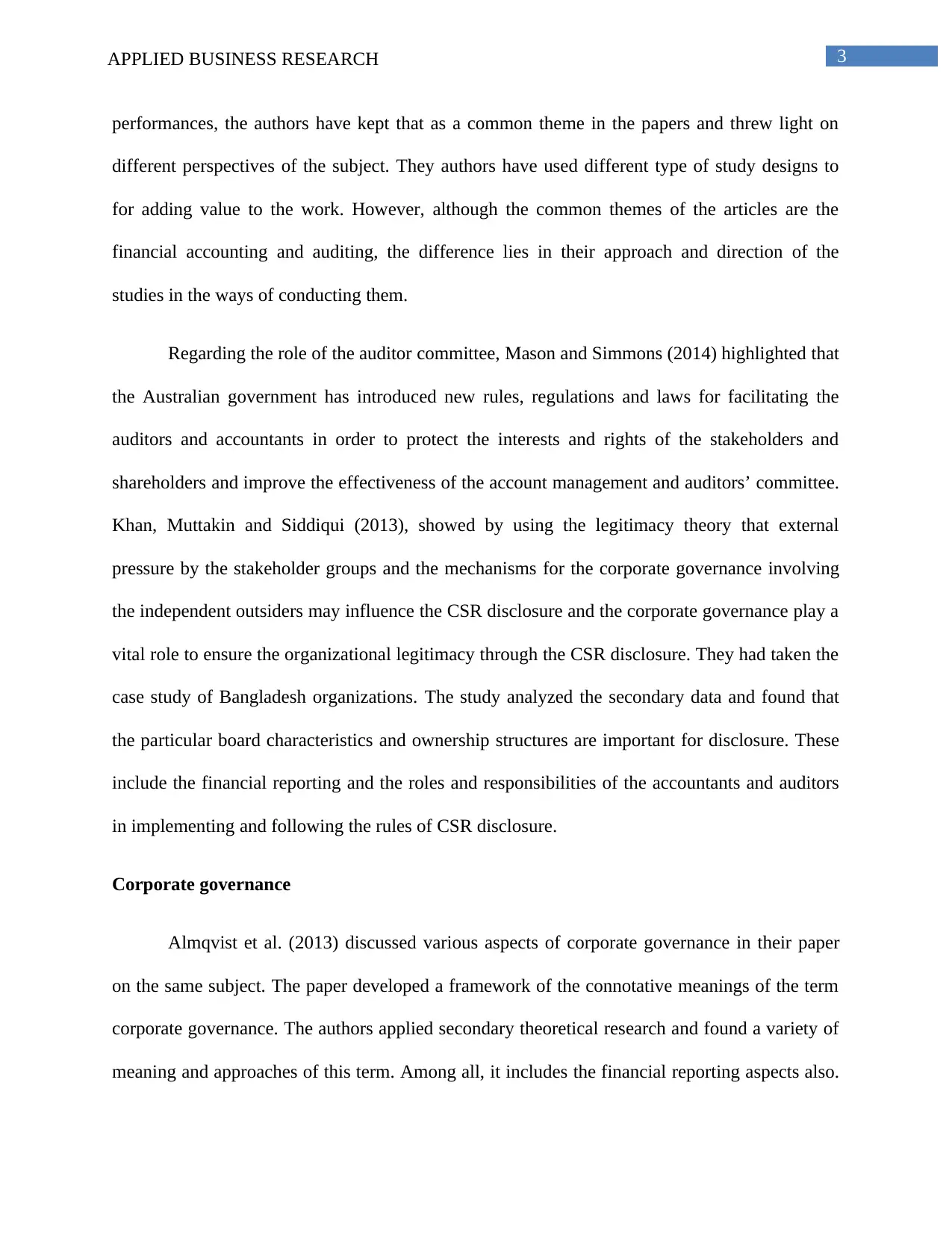
3APPLIED BUSINESS RESEARCH
performances, the authors have kept that as a common theme in the papers and threw light on
different perspectives of the subject. They authors have used different type of study designs to
for adding value to the work. However, although the common themes of the articles are the
financial accounting and auditing, the difference lies in their approach and direction of the
studies in the ways of conducting them.
Regarding the role of the auditor committee, Mason and Simmons (2014) highlighted that
the Australian government has introduced new rules, regulations and laws for facilitating the
auditors and accountants in order to protect the interests and rights of the stakeholders and
shareholders and improve the effectiveness of the account management and auditors’ committee.
Khan, Muttakin and Siddiqui (2013), showed by using the legitimacy theory that external
pressure by the stakeholder groups and the mechanisms for the corporate governance involving
the independent outsiders may influence the CSR disclosure and the corporate governance play a
vital role to ensure the organizational legitimacy through the CSR disclosure. They had taken the
case study of Bangladesh organizations. The study analyzed the secondary data and found that
the particular board characteristics and ownership structures are important for disclosure. These
include the financial reporting and the roles and responsibilities of the accountants and auditors
in implementing and following the rules of CSR disclosure.
Corporate governance
Almqvist et al. (2013) discussed various aspects of corporate governance in their paper
on the same subject. The paper developed a framework of the connotative meanings of the term
corporate governance. The authors applied secondary theoretical research and found a variety of
meaning and approaches of this term. Among all, it includes the financial reporting aspects also.
performances, the authors have kept that as a common theme in the papers and threw light on
different perspectives of the subject. They authors have used different type of study designs to
for adding value to the work. However, although the common themes of the articles are the
financial accounting and auditing, the difference lies in their approach and direction of the
studies in the ways of conducting them.
Regarding the role of the auditor committee, Mason and Simmons (2014) highlighted that
the Australian government has introduced new rules, regulations and laws for facilitating the
auditors and accountants in order to protect the interests and rights of the stakeholders and
shareholders and improve the effectiveness of the account management and auditors’ committee.
Khan, Muttakin and Siddiqui (2013), showed by using the legitimacy theory that external
pressure by the stakeholder groups and the mechanisms for the corporate governance involving
the independent outsiders may influence the CSR disclosure and the corporate governance play a
vital role to ensure the organizational legitimacy through the CSR disclosure. They had taken the
case study of Bangladesh organizations. The study analyzed the secondary data and found that
the particular board characteristics and ownership structures are important for disclosure. These
include the financial reporting and the roles and responsibilities of the accountants and auditors
in implementing and following the rules of CSR disclosure.
Corporate governance
Almqvist et al. (2013) discussed various aspects of corporate governance in their paper
on the same subject. The paper developed a framework of the connotative meanings of the term
corporate governance. The authors applied secondary theoretical research and found a variety of
meaning and approaches of this term. Among all, it includes the financial reporting aspects also.
Paraphrase This Document
Need a fresh take? Get an instant paraphrase of this document with our AI Paraphraser
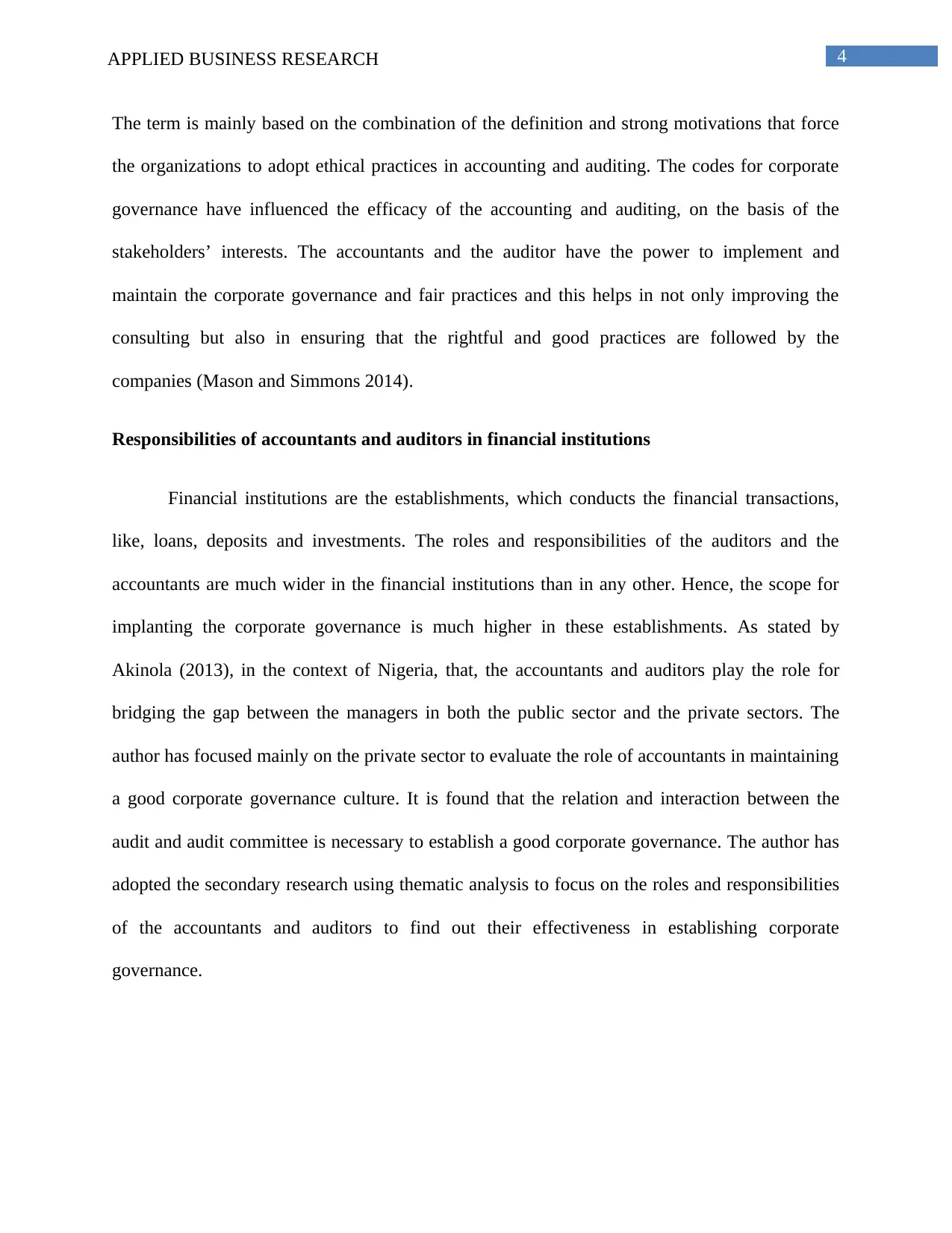
4APPLIED BUSINESS RESEARCH
The term is mainly based on the combination of the definition and strong motivations that force
the organizations to adopt ethical practices in accounting and auditing. The codes for corporate
governance have influenced the efficacy of the accounting and auditing, on the basis of the
stakeholders’ interests. The accountants and the auditor have the power to implement and
maintain the corporate governance and fair practices and this helps in not only improving the
consulting but also in ensuring that the rightful and good practices are followed by the
companies (Mason and Simmons 2014).
Responsibilities of accountants and auditors in financial institutions
Financial institutions are the establishments, which conducts the financial transactions,
like, loans, deposits and investments. The roles and responsibilities of the auditors and the
accountants are much wider in the financial institutions than in any other. Hence, the scope for
implanting the corporate governance is much higher in these establishments. As stated by
Akinola (2013), in the context of Nigeria, that, the accountants and auditors play the role for
bridging the gap between the managers in both the public sector and the private sectors. The
author has focused mainly on the private sector to evaluate the role of accountants in maintaining
a good corporate governance culture. It is found that the relation and interaction between the
audit and audit committee is necessary to establish a good corporate governance. The author has
adopted the secondary research using thematic analysis to focus on the roles and responsibilities
of the accountants and auditors to find out their effectiveness in establishing corporate
governance.
The term is mainly based on the combination of the definition and strong motivations that force
the organizations to adopt ethical practices in accounting and auditing. The codes for corporate
governance have influenced the efficacy of the accounting and auditing, on the basis of the
stakeholders’ interests. The accountants and the auditor have the power to implement and
maintain the corporate governance and fair practices and this helps in not only improving the
consulting but also in ensuring that the rightful and good practices are followed by the
companies (Mason and Simmons 2014).
Responsibilities of accountants and auditors in financial institutions
Financial institutions are the establishments, which conducts the financial transactions,
like, loans, deposits and investments. The roles and responsibilities of the auditors and the
accountants are much wider in the financial institutions than in any other. Hence, the scope for
implanting the corporate governance is much higher in these establishments. As stated by
Akinola (2013), in the context of Nigeria, that, the accountants and auditors play the role for
bridging the gap between the managers in both the public sector and the private sectors. The
author has focused mainly on the private sector to evaluate the role of accountants in maintaining
a good corporate governance culture. It is found that the relation and interaction between the
audit and audit committee is necessary to establish a good corporate governance. The author has
adopted the secondary research using thematic analysis to focus on the roles and responsibilities
of the accountants and auditors to find out their effectiveness in establishing corporate
governance.
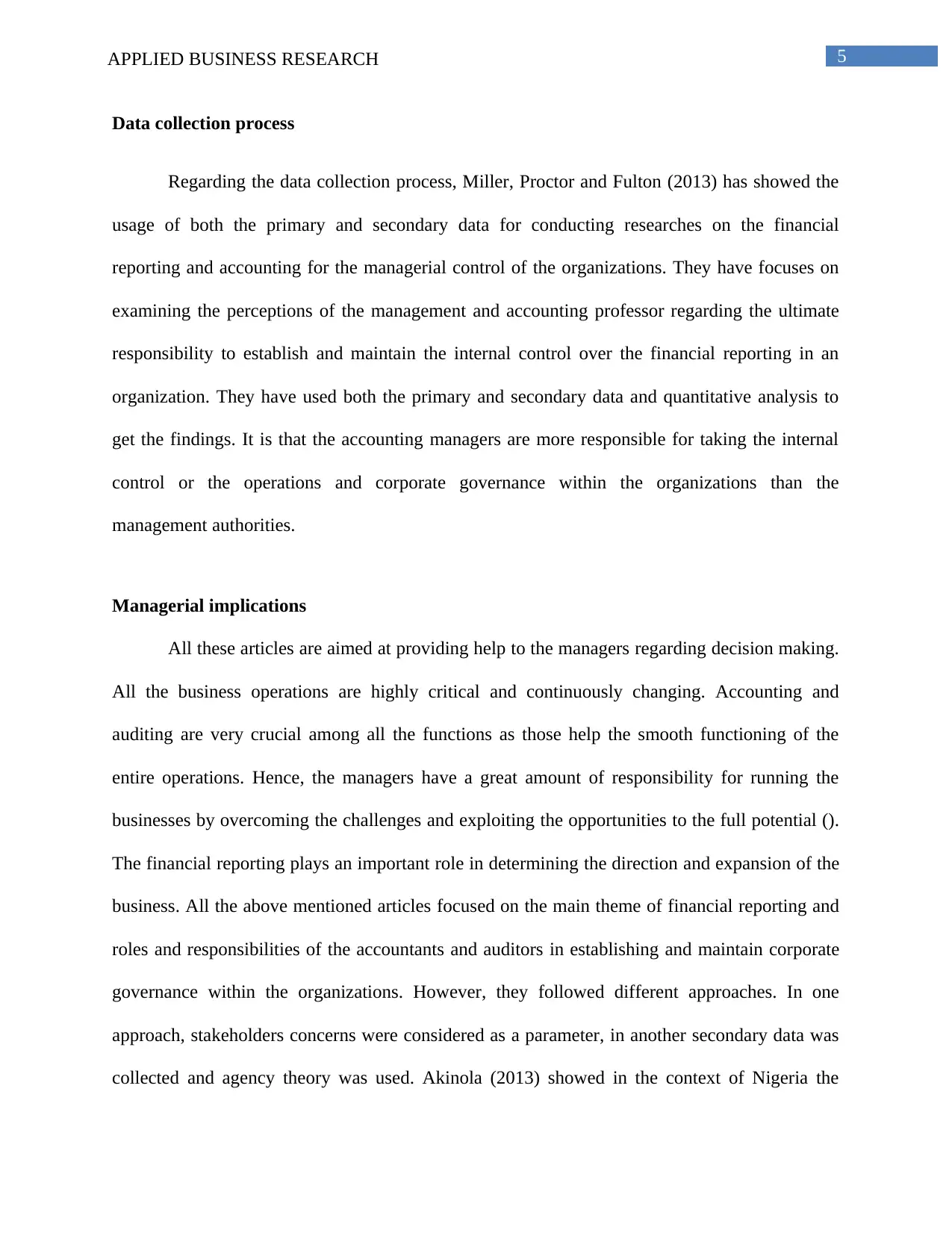
5APPLIED BUSINESS RESEARCH
Data collection process
Regarding the data collection process, Miller, Proctor and Fulton (2013) has showed the
usage of both the primary and secondary data for conducting researches on the financial
reporting and accounting for the managerial control of the organizations. They have focuses on
examining the perceptions of the management and accounting professor regarding the ultimate
responsibility to establish and maintain the internal control over the financial reporting in an
organization. They have used both the primary and secondary data and quantitative analysis to
get the findings. It is that the accounting managers are more responsible for taking the internal
control or the operations and corporate governance within the organizations than the
management authorities.
Managerial implications
All these articles are aimed at providing help to the managers regarding decision making.
All the business operations are highly critical and continuously changing. Accounting and
auditing are very crucial among all the functions as those help the smooth functioning of the
entire operations. Hence, the managers have a great amount of responsibility for running the
businesses by overcoming the challenges and exploiting the opportunities to the full potential ().
The financial reporting plays an important role in determining the direction and expansion of the
business. All the above mentioned articles focused on the main theme of financial reporting and
roles and responsibilities of the accountants and auditors in establishing and maintain corporate
governance within the organizations. However, they followed different approaches. In one
approach, stakeholders concerns were considered as a parameter, in another secondary data was
collected and agency theory was used. Akinola (2013) showed in the context of Nigeria the
Data collection process
Regarding the data collection process, Miller, Proctor and Fulton (2013) has showed the
usage of both the primary and secondary data for conducting researches on the financial
reporting and accounting for the managerial control of the organizations. They have focuses on
examining the perceptions of the management and accounting professor regarding the ultimate
responsibility to establish and maintain the internal control over the financial reporting in an
organization. They have used both the primary and secondary data and quantitative analysis to
get the findings. It is that the accounting managers are more responsible for taking the internal
control or the operations and corporate governance within the organizations than the
management authorities.
Managerial implications
All these articles are aimed at providing help to the managers regarding decision making.
All the business operations are highly critical and continuously changing. Accounting and
auditing are very crucial among all the functions as those help the smooth functioning of the
entire operations. Hence, the managers have a great amount of responsibility for running the
businesses by overcoming the challenges and exploiting the opportunities to the full potential ().
The financial reporting plays an important role in determining the direction and expansion of the
business. All the above mentioned articles focused on the main theme of financial reporting and
roles and responsibilities of the accountants and auditors in establishing and maintain corporate
governance within the organizations. However, they followed different approaches. In one
approach, stakeholders concerns were considered as a parameter, in another secondary data was
collected and agency theory was used. Akinola (2013) showed in the context of Nigeria the
⊘ This is a preview!⊘
Do you want full access?
Subscribe today to unlock all pages.

Trusted by 1+ million students worldwide
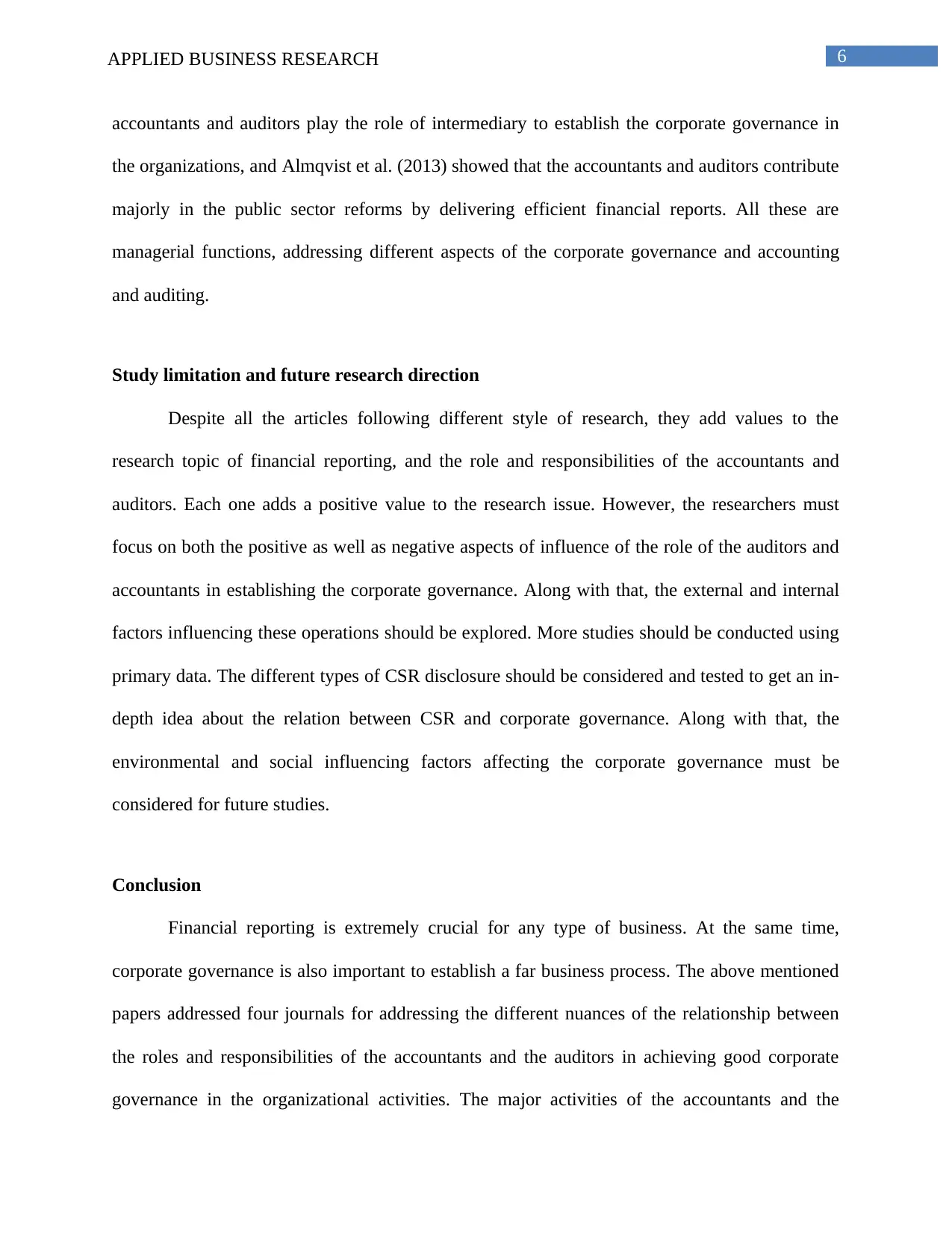
6APPLIED BUSINESS RESEARCH
accountants and auditors play the role of intermediary to establish the corporate governance in
the organizations, and Almqvist et al. (2013) showed that the accountants and auditors contribute
majorly in the public sector reforms by delivering efficient financial reports. All these are
managerial functions, addressing different aspects of the corporate governance and accounting
and auditing.
Study limitation and future research direction
Despite all the articles following different style of research, they add values to the
research topic of financial reporting, and the role and responsibilities of the accountants and
auditors. Each one adds a positive value to the research issue. However, the researchers must
focus on both the positive as well as negative aspects of influence of the role of the auditors and
accountants in establishing the corporate governance. Along with that, the external and internal
factors influencing these operations should be explored. More studies should be conducted using
primary data. The different types of CSR disclosure should be considered and tested to get an in-
depth idea about the relation between CSR and corporate governance. Along with that, the
environmental and social influencing factors affecting the corporate governance must be
considered for future studies.
Conclusion
Financial reporting is extremely crucial for any type of business. At the same time,
corporate governance is also important to establish a far business process. The above mentioned
papers addressed four journals for addressing the different nuances of the relationship between
the roles and responsibilities of the accountants and the auditors in achieving good corporate
governance in the organizational activities. The major activities of the accountants and the
accountants and auditors play the role of intermediary to establish the corporate governance in
the organizations, and Almqvist et al. (2013) showed that the accountants and auditors contribute
majorly in the public sector reforms by delivering efficient financial reports. All these are
managerial functions, addressing different aspects of the corporate governance and accounting
and auditing.
Study limitation and future research direction
Despite all the articles following different style of research, they add values to the
research topic of financial reporting, and the role and responsibilities of the accountants and
auditors. Each one adds a positive value to the research issue. However, the researchers must
focus on both the positive as well as negative aspects of influence of the role of the auditors and
accountants in establishing the corporate governance. Along with that, the external and internal
factors influencing these operations should be explored. More studies should be conducted using
primary data. The different types of CSR disclosure should be considered and tested to get an in-
depth idea about the relation between CSR and corporate governance. Along with that, the
environmental and social influencing factors affecting the corporate governance must be
considered for future studies.
Conclusion
Financial reporting is extremely crucial for any type of business. At the same time,
corporate governance is also important to establish a far business process. The above mentioned
papers addressed four journals for addressing the different nuances of the relationship between
the roles and responsibilities of the accountants and the auditors in achieving good corporate
governance in the organizational activities. The major activities of the accountants and the
Paraphrase This Document
Need a fresh take? Get an instant paraphrase of this document with our AI Paraphraser
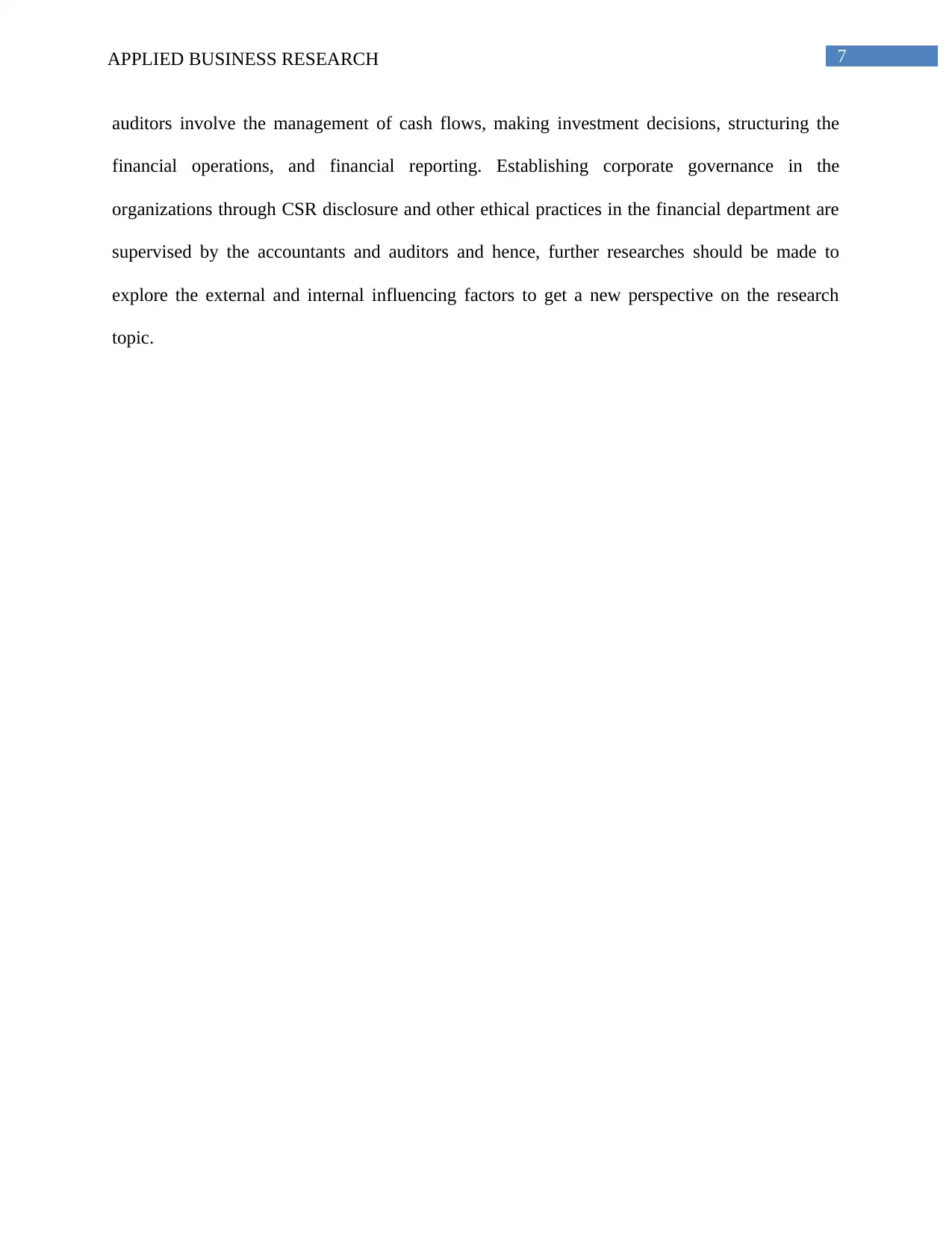
7APPLIED BUSINESS RESEARCH
auditors involve the management of cash flows, making investment decisions, structuring the
financial operations, and financial reporting. Establishing corporate governance in the
organizations through CSR disclosure and other ethical practices in the financial department are
supervised by the accountants and auditors and hence, further researches should be made to
explore the external and internal influencing factors to get a new perspective on the research
topic.
auditors involve the management of cash flows, making investment decisions, structuring the
financial operations, and financial reporting. Establishing corporate governance in the
organizations through CSR disclosure and other ethical practices in the financial department are
supervised by the accountants and auditors and hence, further researches should be made to
explore the external and internal influencing factors to get a new perspective on the research
topic.
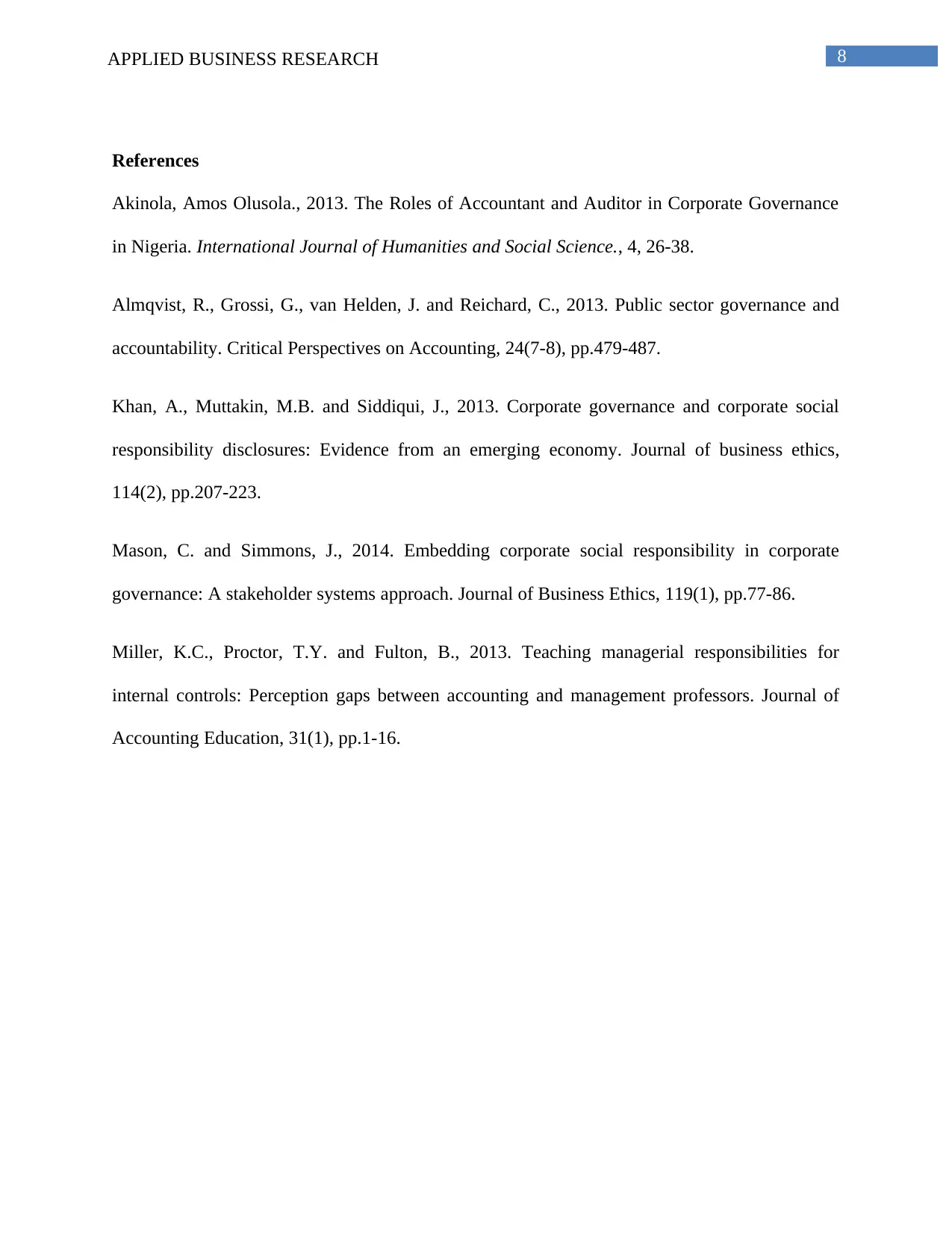
8APPLIED BUSINESS RESEARCH
References
Akinola, Amos Olusola., 2013. The Roles of Accountant and Auditor in Corporate Governance
in Nigeria. International Journal of Humanities and Social Science., 4, 26-38.
Almqvist, R., Grossi, G., van Helden, J. and Reichard, C., 2013. Public sector governance and
accountability. Critical Perspectives on Accounting, 24(7-8), pp.479-487.
Khan, A., Muttakin, M.B. and Siddiqui, J., 2013. Corporate governance and corporate social
responsibility disclosures: Evidence from an emerging economy. Journal of business ethics,
114(2), pp.207-223.
Mason, C. and Simmons, J., 2014. Embedding corporate social responsibility in corporate
governance: A stakeholder systems approach. Journal of Business Ethics, 119(1), pp.77-86.
Miller, K.C., Proctor, T.Y. and Fulton, B., 2013. Teaching managerial responsibilities for
internal controls: Perception gaps between accounting and management professors. Journal of
Accounting Education, 31(1), pp.1-16.
References
Akinola, Amos Olusola., 2013. The Roles of Accountant and Auditor in Corporate Governance
in Nigeria. International Journal of Humanities and Social Science., 4, 26-38.
Almqvist, R., Grossi, G., van Helden, J. and Reichard, C., 2013. Public sector governance and
accountability. Critical Perspectives on Accounting, 24(7-8), pp.479-487.
Khan, A., Muttakin, M.B. and Siddiqui, J., 2013. Corporate governance and corporate social
responsibility disclosures: Evidence from an emerging economy. Journal of business ethics,
114(2), pp.207-223.
Mason, C. and Simmons, J., 2014. Embedding corporate social responsibility in corporate
governance: A stakeholder systems approach. Journal of Business Ethics, 119(1), pp.77-86.
Miller, K.C., Proctor, T.Y. and Fulton, B., 2013. Teaching managerial responsibilities for
internal controls: Perception gaps between accounting and management professors. Journal of
Accounting Education, 31(1), pp.1-16.
⊘ This is a preview!⊘
Do you want full access?
Subscribe today to unlock all pages.

Trusted by 1+ million students worldwide
1 out of 9
Related Documents
Your All-in-One AI-Powered Toolkit for Academic Success.
+13062052269
info@desklib.com
Available 24*7 on WhatsApp / Email
![[object Object]](/_next/static/media/star-bottom.7253800d.svg)
Unlock your academic potential
Copyright © 2020–2025 A2Z Services. All Rights Reserved. Developed and managed by ZUCOL.




